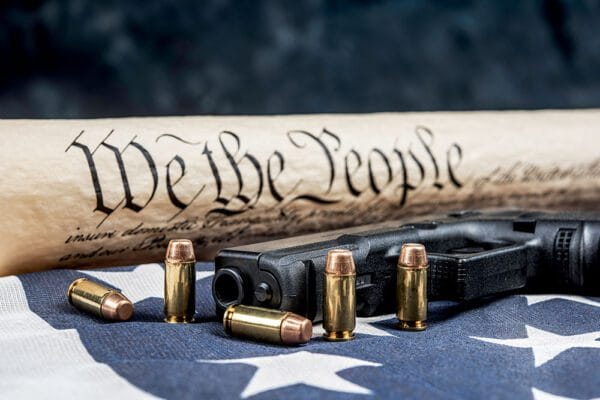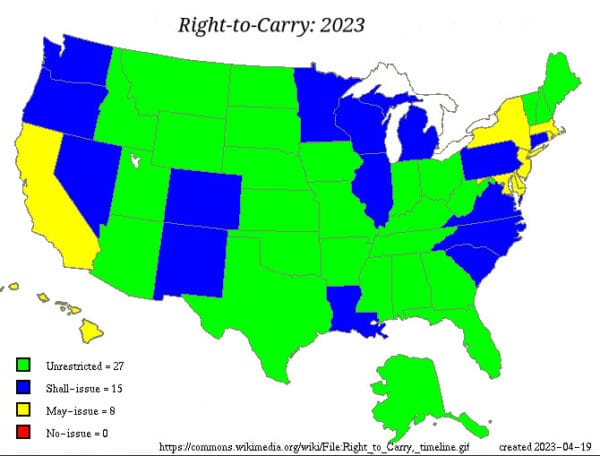
On March 5, 2024, Governor Landry of Louisiana signed Bill SB 1, Constitutional Carry into law, now known as Act No. 1. The new law will go into effect on July 4, 2024. Constitutional Carry is one of eleven interrelated crime bills designed to reduce crime in Louisiana. All eleven bills were passed in the special session on crime called for by Governor Landry
SB 2 was another of the crime reform bills SB 2 limits the liability of a person who justifiably uses a handgun in self-defense. It provides immunity from civil liability for damages for injury, death, or loss suffered by a perpetrator. The eleven crime bills are listed below. All eleven bills were signed on March 5, 2024.
- SB 1: Constitutional Carry
- SB 2: Concealed Carry Permit Immunity
- HB 3: Expanding Access to Drug Courts
- HB 4: Post Conviction Reform
- SB 5: Pardon and Parole Reform
- HB 6: Justice for Victims
- SB 7: DUI Penalties
- SB 9: Preserving Prosecutions for Rape
- HB 9: Probation and Parole Violations
- HB 10: Truth in Sentencing
- HB 11: Offender Rehabilitation
Constitutional Carry, as exemplified by SP1 in Louisiana, has an exemption for those prohibited from carrying a firearm under state or federal law. From a previous article on AmmoLand:
M. The provisions of Paragraph (A)(1) of this Section shall not apply to any person who is eighteen years of age or older and is not prohibited from possessing a firearm under R.S.14:95.1, 18 U.S.C. 922(g), or any other state or federal law.
SB 1 is a good step toward restoring the free exercise of the right to keep and bear arms in Louisiana. Adults who are not prohibited possessors of firearms under state and federal law will be able to carry loaded handguns, openly or concealed, in most public spaces, without fear of being arrested. They will not be required to ask permission of a government official before exercising their rights.
SB1 was passed with overwhelming margins along party-line votes in the legislature. On February 2, 2024, it passed in the Senate 28 to 10. On February 28, it passed in the House, 76 to 28. SB1 was sent to Governor Landry on February 29, 2025.
With the passage of SB 1, Louisiana becomes the 28th member of the permitless (Constitutional Carry) club.
Every new state entering the club has met with predictions of “blood in the streets.” It has not happened. Detractors of Constitutional Carry can, with considerable searching, find statistical anomalies where a particular type of crime increased in a state or a city for a period of time. These are outliers. When all the data is looked at over long periods of time, the pattern is clear. There is little change. What change there is, tends to be positive. Murder rates tend to drop a little. Justified homicides tend to rise a little. Property crime may rise a little as confrontational crime against persons drops a little. With the addition of the State of Louisiana, the ability of an ordinary person to carry a loaded handgun in most public places, without asking for permission from a governmental authority, is now the law in over 2/3 the land area of the USA.
The states who now have Constitutional (permitless) Carry are:
Alabama, Alaska, Arizona, Arkansas, Florida (permitless), Georgia, Idaho, Indiana, Iowa, Kansas, Kentucky, Louisiana, Maine, Mississippi, Missouri, Montana, Nebraska, New Hampshire, North Dakota, Ohio, Oklahoma, South Dakota, Tennessee, Texas, Utah, Vermont, West Virginia, and Wyoming.

This correspondent is not a fan of placing exemptions in state law, which depends on federal law or federal definitions. The practice places the state at the mercy of law changes at the federal level. Such a practice limits the purpose of federalism and reduces the sovereignty of the state.
The major effect of removing infringements on the exercise of Second Amendment rights is a return to the rule of law. Citizens see the Constitution means something. The power of government is limited. The Bill of Rights is not completely changeable by Judges who wish to impose their personal theories on the rest of society.
About Dean Weingarten:
Dean Weingarten has been a peace officer, a military officer, was on the University of Wisconsin Pistol Team for four years, and was first certified to teach firearms safety in 1973. He taught the Arizona concealed carry course for fifteen years until the goal of Constitutional Carry was attained. He has degrees in meteorology and mining engineering, and retired from the Department of Defense after a 30 year career in Army Research, Development, Testing, and Evaluation.

from https://ift.tt/inpaTw4
via IFTTT

No comments:
Post a Comment